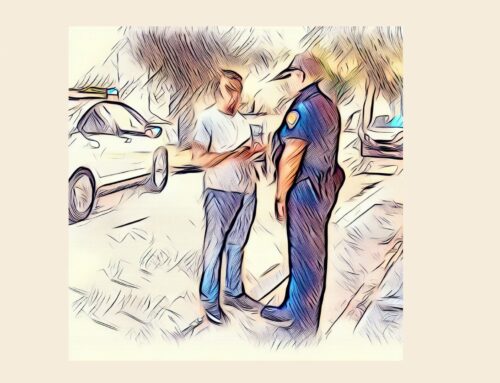What To Do If You Think You Are Under Criminal Investigation and a Detective Contacts You
Discovering you may be under criminal investigation can be an alarming and stressful experience. Many people are unsure how to respond when detectives reach out requesting information or an interview. While you always have the right to remain silent, cooperating with law enforcement strategically can sometimes help resolve matters more quickly. Here are some important things to consider if you find yourself in this situation.
Don’t Panic, But Do Consult a Lawyer
The first thing you should do if contacted by a detective is try to stay calm. Just because an investigation is underway does not necessarily mean you will be charged with a crime. Try not to speculate about worst-case scenarios until you have more information.
However, consulting with a qualified criminal defense lawyer as soon as possible is essential. Do not agree to speak with detectives, provide statements, or turn over documents before talking to counsel. An experienced attorney can advise you on how to interact with investigators in a way that best protects your rights. Having legal representation ensures what you say will not be used against you.
Ask the Detective Basic Questions About the Investigation
When first contacted by law enforcement, you are entitled to ask for some basic information about what they are investigating, such as:
- What alleged crime are they investigating?
- Is there a warrant for your arrest?
- What is your status in the investigation (witness, suspect, person of interest)?
- What prompted the investigation and contact with you?
Getting clarity on these issues can help you and your lawyer understand how to respond appropriately. Be aware that detectives are not required to answer all these questions, but there is no harm in politely asking. Just avoid accidentally making any statements that could be incriminating.
Decide If You Will Voluntarily Speak with Detectives
After consulting counsel, you will need to decide whether or not to voluntarily cooperate by providing a statement or submitting to questioning. There are a few key factors to consider:
Potential Benefits of Cooperating
- Demonstrates you have nothing to hide and are willing to aid law enforcement. This could prevent criminal charges from being filed.
- Provides an opportunity to tell your side of the story and refute false allegations.
- Helps move the investigation along more quickly so the matter does not linger over your head.
- Makes you appear cooperative which can positively influence potential plea negotiations or sentencing later on if charges are filed.
Risks of Cooperating
- Any statement you provide, even explaining your innocence, may be used against you later.
- Answering questions without knowing all the evidence detectives have could lead you to make inconsistent or confusing statements.
- Investigators are trained to get information out of people, so an interview could lead you to accidentally divulge information you shouldn’t.
- You may be arrested on the spot if detectives do not find your statements credible.
Carefully weighing these risks and benefits with counsel will make the best decision for your unique situation. Many times it is in a person’s best interest to politely decline an interview and continue communications through their lawyer.
Follow Your Attorney’s Advice Related to Interviews, Records Requests and More
If you do decide to voluntarily cooperate with an investigation, your lawyer will advise you on the following:
- Determine the format of any interview – Would an informal discussion with detectives be preferable? Or is a more formal deposition-style questioning needed?
- Negotiate the scope of questioning – Work with counsel to establish guidelines on what topics investigators can ask you about. Off-limit subjects should be declared upfront.
- Request records in advance – Ask to review relevant police reports, videos, forensic analyses, and other materials before interviews so you understand all existing evidence.
- Establish ground rules – Your lawyer can seek agreements clarifying that nothing you say can be used directly against you in future court proceedings.
- Have counsel present – Never submit to formal questioning alone. Your lawyer should be present to ensure proper procedures are followed. They can also intervene to protect your rights.
- Follow-up in writing – After interviews, follow your attorney’s advice regarding memorializing your statements in an affidavit to prevent mischaracterizations.
Cooperating strategically while relying on experienced legal guidance maximizes the benefits while reducing risks. Do not take any substantive actions without your lawyer’s approval. Their role is to protect you.
Understand Your Miranda Rights if Arrested
While an arrest comes as a shock, being prepared and knowing your rights is important. If taken into police custody, the officers must read you the standard Miranda rights before any interrogation:
- You have the right to remain silent. Anything you say can be used against you in court.
- You have the right to an attorney during questioning. If you cannot afford one, a lawyer will be appointed to you at no cost.
- You can invoke these rights anytime and stop answering questions or making statements.
If you are unsure you fully understand your rights, ask the officers to clarify before deciding whether to waive them and speak to detectives. In many instances, it is wise to politely inform the police you will not answer any substantive questions without your lawyer present. This protects against making risky statements that could compromise your defense.
Do Not Try to Destroy Evidence or Obstruct the Investigation
A natural reaction upon learning of an investigation may be to want to get rid of any potentially incriminating evidence. Resist this urge. Intentionally destroying or concealing documents, electronic records, or other items specifically to keep them out of the hands of law enforcement is illegal obstruction of justice.
This could lead to additional criminal charges and make you appear guilty of the underlying alleged crimes. Any communications encouraging others who may have evidence to lie to detectives or impede their work could also constitute obstruction. Let your lawyer handle properly interacting with investigators – do not take matters into your own hands.
Start Preparing Your Legal Defense Proactively
Instead of panicking or resorting to obstruction, use the knowledge that an investigation is underway to start methodically building your legal defense. Creating a timeline of relevant events and identifying potential witnesses, alibis, financial records, communications, and other evidence that refutes allegations or shows lawful conduct can be invaluable.
Work closely with your attorney to pull together anything that may be relevant. Having this information organized can also aid in responding to any requests from law enforcement. Be sure to follow counsel’s advice regarding retention and production of documents – do not hand over anything without their review.
Thinking through explanatory scenarios and practicing potential responses to difficult questions with your lawyer will prepare you for possible interviews. While no one expects to become the target of a criminal probe, being ready to respond strategically at the first sign of trouble can help lead to the best possible outcome.
Seek Outside Support From Family and Professionals
Finding out you are under criminal investigation can negatively impact mental health and relationships. Do not be afraid to confide in close family members and friends for moral support during this difficult time. Also, consider consulting a therapist or counselor to help manage stress and anxiety.
Continue focusing energy at work or school, so your professional life does not suffer. Do not be afraid to let employers know of the situation, as they may allow some scheduling flexibility for legal matters. A strong support system is crucial to avoiding isolation and facing challenges daily while your case progresses.
Don’t Lose Hope
Trying times like criminal investigations test our mettle. Yet, even if formal charges are filed, that does not mean you will be convicted, or your life is ruined. With an experienced criminal defense lawyer guiding you, many options exist to resolve allegations favorably – or at least mitigate penalties.
A proactive, strategic response focused on protecting your rights can be empowering. The authorities likely contacted you because they have questions – not definitive proof of guilt beyond a reasonable doubt. Be confident in yourself and trust your legal counsel. Facing the situation head-on lessens its control over your life. With dedication and persistence, overcoming this challenge is possible. Don’t lose hope.
CALL US NOW for a CONFIDENTIAL INITIAL CONSULTATION at (305) 538-4545, or take a moment to fill out our confidential and secure intake form.* The additional details you provide will greatly assist us in responding to your inquiry.
THERE ARE THOUSANDS OF LAW FIRMS AND ATTORNEYS IN SOUTH FLORIDA. ALWAYS INVESTIGATE A LAWYER’S QUALIFICATIONS AND EXPERIENCE BEFORE MAKING A DECISION ON HIRING A CRIMINAL DEFENSE ATTORNEY ATTORNEY FOR YOUR MIAMI-DADE COUNTY CASE









